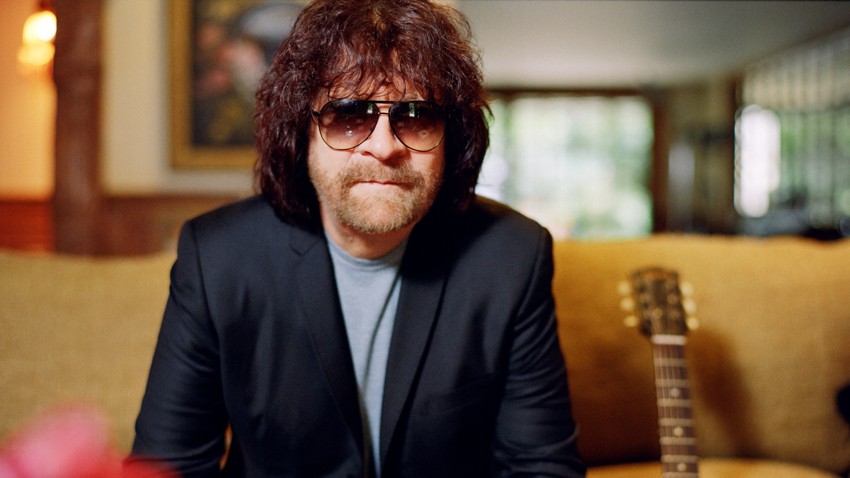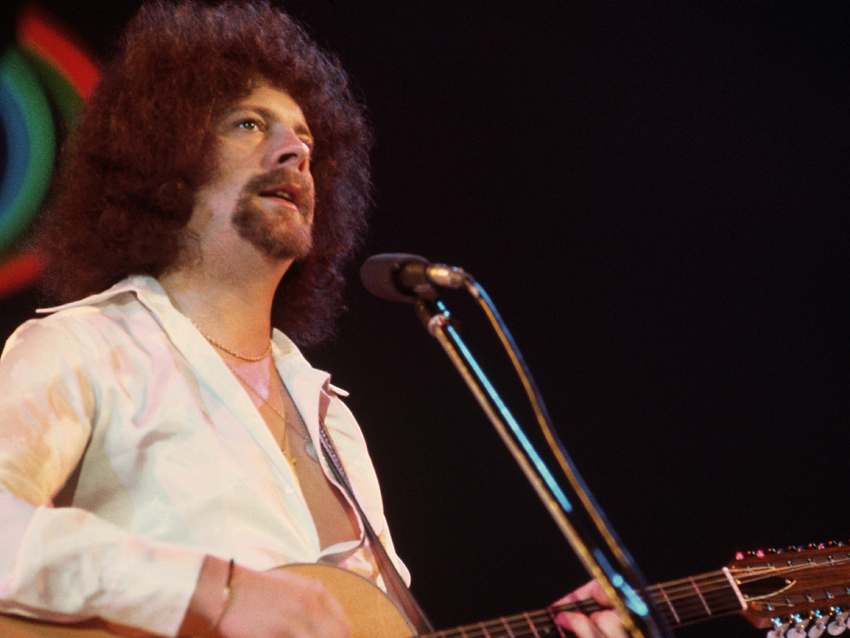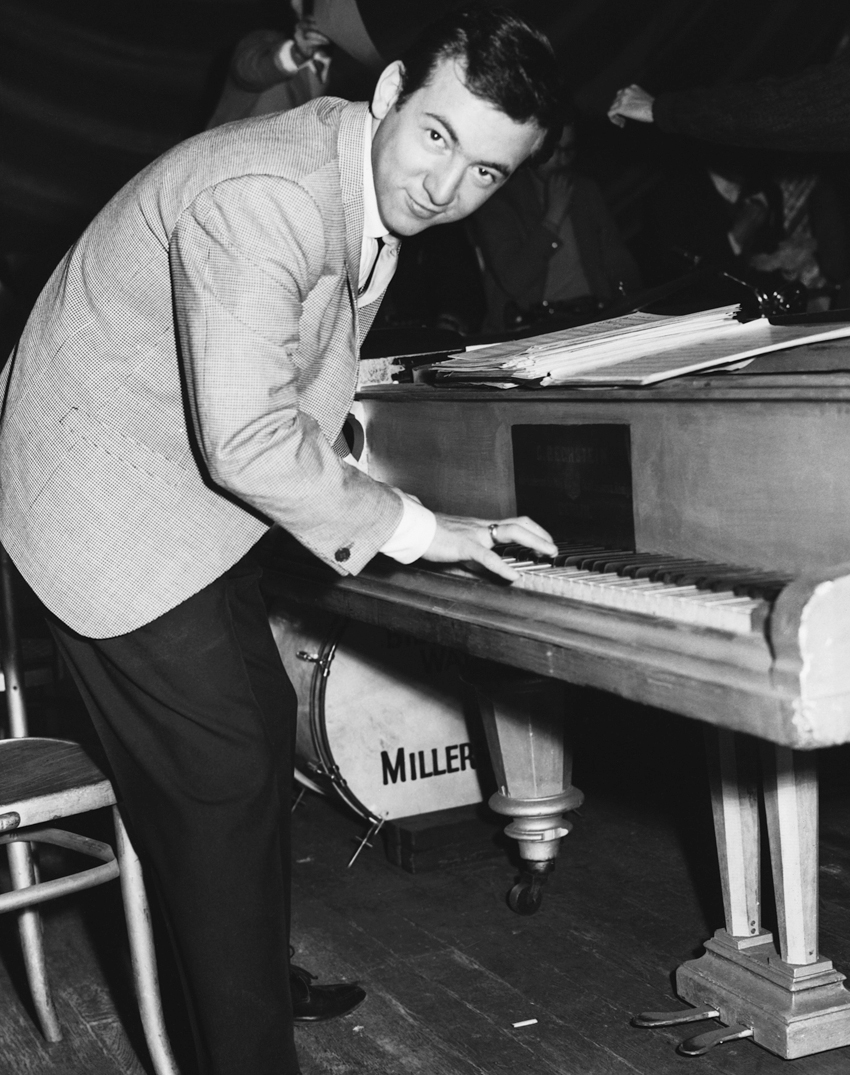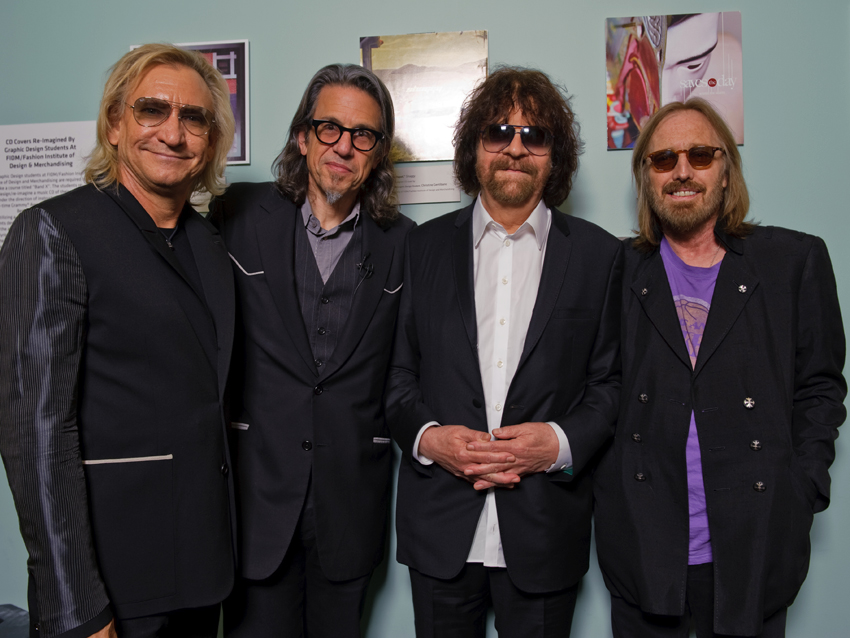
One thing you have to say about Jeff Lynne: the man doesn't back down from a challenge. Two of them, in fact. On a pair of just-released new albums, the creative force behind the Electric Light Orchestra, former Traveling Wilburys member and the man the Washington Times called the fourth greatest record producer in history, treads confidently on what many music fans would consider to be sacred ground.
Long Wave sees the singer-songwriter and multi-instrumentalist paying tribute to some of the songs that first filled his senses as a child, covering standards such as Smile, Beyond The Sea, Running Scared, At Last, and Mercy, Mercy.
Lynne played every instrument on Long Wave, which he also does on Mr. Blue Sky - The Very Best Of Electric Light Orchestra, a fascinating, deeply entertaining reworking of his own hits. Evil Woman, Don't Bring Me Down, Telephone Line, Livin' Thing - they're all here and more. Lynne doesn't maim his ELO legacy so much as puts a fresh spin on some of the greatest pop-rock songs to flood the radio waves during the '70s and early '80s.
Lynne sat down with MusicRadar to discuss the origins behind both albums, the guitars he used, how he felt tackling songs associated with the likes of Bobby Darin, Nat King Cole and Etta James, and whether it was strange trying to one-up himself.
On Mr. Blue Sky, amongst other credits, you're listed as playing cowbell.
[Laughs] "Yes. Hey, don't knock it. I've tried for years to learn that."
When you were recording, did you keep saying to yourself, "I've got a fever, and the only prescription is… more cowbell!"?
Want all the hottest music and gear news, reviews, deals, features and more, direct to your inbox? Sign up here.
"Absolutely! Of course that little joke kept going around in my head as I was doing it. Then when I played the mixes for somebody, I put the cowbell up ridiculously loud, just for fun."
You play all the instruments on both albums. With all the people you've produced and worked with, why the one-man band approach?
"Because you know what? That's what I really love to do - I love to play all the instruments. To me, the one-man band thing is when I'm the happiest and most fulfilled. It's so much fun. Like on Long Wave, for each song, I would take the old record and play it a hundred times. I'd learn the guitar part, the bass part, the drum part, the piano part, learn all the chords - and it was great! Then I'd play it myself in my own style.
"I was very true to each song musically. I used all the proper chords, but I changed the arrangements a bit. Really, I just simplified them, because a lot of those songs have so many things going on - flutes, clarinets, some other things. It was interesting. I've loved these songs for so long, from before I learned to play the guitar, but I've always been scared of them. You go, 'What the hell's going on here?', you know? [Laughs] There's so much in these arrangements.
"So what I did was, I developed a kind of tunnel hearing. I'd listen to different parts at a time. You can zoom right in and concentrate on the bass if you try real hard."

Lynne on stage with the Electric Light Orchestra in 1977. © Neal Preston/CORBIS
You were working in your home studio?
"Oh, yes."
What kind of setup do you have?
"A pretty good one, actually. I've got a 40-channel analogue desk. And then I've got the Pro Tools rig and all the latest gear. I can still keep the analogue distortion going and make everything sound warm and great, but I've also got the modern facilities of the digital environment. I use plug-ins sometimes, and they work really well."
Looking at both projects together, one would assume you're in somewhat of a nostalgic mood.
"I guess so. I was just looking for something that would fulfill me, and I started looking at all of these old tunes. I was listening to iTunes and buying all of these old records, all the ones I used to hear as a kid, at home in my mom and dad's house in Birmingham. The thought of trying to re-create those things was such a great pull - I just couldn't resist it.
"It just came to me about three years ago. Concurrently with the Mr. Blue Sky album, that's when I started this record. I tried one first, the song She - it's not that old, but I liked it. Obviously, I couldn't sing it like Charles Aznavour, so I sang it like me. I tried the harmony route on that; every verse was filled with three-part harmony.
"Then I played it for Paul McCartney, and he loved it. But he said, 'Why don't you leave that first verse a little empty so you can build up?' Because it was so full that there was nowhere to go. I thought that was a great idea, so I tried it, did a remix on it, and that's how it came out. All thanks to Paul."
Because of the nature of Long Wave, did you stick with more vintage instruments and gear?
"Well, I do both, really. I've got the analogue desk, and then there's various miking techniques - I was miking things a little bit further away to get that vintage sound. Back then, there weren't all of these close mics. All the outboard gear is mainly analogue, except for things like the AMS, which is the first great digital echo machine. I class that as a vintage piece, as well."
I love your version of Beyond The Sea. Were you a big Bobby Darin fan?
"Oh, I was a big fan. What's interesting is, he'd actually transposed his music to 20 years earlier, that big band arrangement. It sounded old when Bobby did it. So it really works now 'cause it sounds so old! [Laughs] What I marveled at was the drum sound on that. It's such a sound, like a madman running around the studio bashing things with sticks. It sounded brilliant to me as a kid.
"That was the hardest one of the lot, really, because the bass part is furious. It was like, 'How am I going to keep up with this?' [Laughs] It was moving so fast. I practiced it for probably three or four days, just the bass part. It was really hard to do, but that's why I loved it - it was a big challenge."

"He'd actually transposed his music to 20 years earlier, that big band arrangement," Lynne says of Bobby Darin (above), whose song Beyond The Sea is covered on Long Wave. © Hulton-Deutsch Collection/CORBIS
Your guitar solo on the song Smile is terrific. What kind of guitar did you play on that - and is that a phaser I'm hearing?
"No, it's not a phaser. It's EQ, actually. I've got a couple of modules from my old desk, and what I do is, I pick a frequency like around 800 or so, and I sweep around it like it's a wah-wah pedal. It gives it an effect like it's a double tracked. The guitar… I imagine it was a Telecaster, the one I've had since 1966."
Others have covered Smile, but there's still the Nat King Cole version. Did that give you pause for thought?
"Not really, because I'm doing it completely different from what he did. If I could do what I wanted to do with it, I wasn't going to worry about who sang it before. The arrangements on that original were big and fluffy and flowery - not that that was a bad thing, especially in those days. But I couldn't do it like that. So again, I had to get the chords down and just simplify it, more like a pop song than a big epic."
And with At Last, you take on a song so identified with Etta James. You're a brave man!
"Well, thanks very much. I loved doing that one. It's such a great bluesy song. I don't do a lot of that - jazzy, bluesy stuff. I never have. So that one was great for leading me into it. I found it to be a lot of fun. Maybe I'll do more bluesy stuff one day."
Let's move on to Mr. Blue Sky. What was your reason for rerecording your own ELO hits? A lot of people would say they're perfect the way they are.
"Over the years, I've played some of the albums from time to time, and I would go, 'Hmm… I don't know.' And then I'd hear some of the songs on the radio and I'd say, 'That doesn't sound like I thought it did.' So I thought, Maybe I should have another go at these. The first one I tried out was Mr. Blue Sky, just to have the experience, to see if I could do it again. I mean, I have a studio - why not have a go at it?
"I did an A/B with the two versions. On the older one, I sound like I'm about 12 years old! [Laughs] And on the new one, I'm… 64! [Laughs] But that's why I did it, just to see what it'd be like. I played it for lots of people, and they said, 'Well, you should have a go at another one.' That's when I did Evil Woman and Strange Magic - then I was hooked. I had to do more."
Just curious, when you put together your list of songs to redo, did you say, "My God, I've written a lot of hits!"?
[Laughs] "Yeah, I'm chuffed by my list. I never imagined I'd have so many of those. Because, you know, when you write the songs - and we're talking 35 years ago - you just think, Oh, I hope it gets in the charts. Or… I wonder if this could be a hit. You don't expect to be talking about it, or having it on the radio and being in the air around the world, all these years later. It amazes me."
On your reworking of Turn To Stone, it still has that wonderful, cosmic feel, but there's an intimacy from the acoustic guitars I never heard before. I could say the same for a lot of the songs.
"Well, you know what? That's the mix in the new recordings. That's why I like to record it all separate and all on my own. You've really got control over it, and I can have any balance that I want, as opposed to recording piano, bass, guitars and drums together on one track, which is what we used to do all those years ago. We had to - we didn't have clicks or drum machines or anything. So you had to keep in time by just looking at one another and playing it.
"This way, I was able to have the balance, the complete separation of the hi-hat, snare, bass drum, all that. Like the rhythm guitars you pointed out, on the first mix I did they weren't loud enough, so I turned 'em up. They sound so much better with the rhythm up loud."
Your guitar work - and sound - on Overture is absolutely brilliant. What guitar did you use on that?
"I used a Les Paul Goldtop. I bought it brand-new from the Guitar Center on Sunset in 1974."
I'm sure you have a pretty nice collection of guitars from over the years. Do you have a tight little set of go-to models?
"Oh, yeah. I use maybe half a dozen electrics. Occasionally, I'll venture out if I want a really weird sound. I've got a really nice 335, and then I've got the Tom Petty Rickenbacker 12-string, which I always use. My favorite guitar is a '58 Strat - and the Tele, which is really an Esquire converted to a Tele. This Epiphone I've had for about three years is just fantastic. It's an old Epiphone - I don't even know what the number is. It's an archtop with one cutaway. Ahh - you can't beat it!"

Lynne celebrates the release of Long Wave and Mr. Blue Sky at the Grammy Museum, Los Angeles, 9 September 2012, along with (from left) Joe Walsh, the Grammy Museum's Scott Goldman, and Tom Petty. © Kevin Estrada
What's the story with the song The Point Of No Return? Was it an ELO song you wrote and recorded but never released?
"No, it was recorded as a one-off about four years ago. I just never had anything to use it for. I remixed it for this album as a bonus track. I really like the song. It's got an excitement to it, the chord shapes and all."
It fits in with the ELO sound, but it's also got a bit of a Traveling Wilburys vibe to it. You might have heard of that group...
[Laughs] "I haven't heard of them, but I'm sure they're good if you recommend them. [Laughs] But that's good that you thought that, because I was trying to make it fit in with the rest of them. That's the way to mix it, to stamp that particular period on it."
I'm curious: As opposed to Long Wave, where you were covering other people's songs, was there any song of yours that gave you trouble? Like, "Wow, how did I do that?"
[Laughs] "Actually, there weren't any surprises, because I've had so much practice since I stopped doing it in '85. I've had so much practice as a producer - 27 years since then. I've learned so much in that time. Experience really is a great thing."
Joe is a freelance journalist who has, over the past few decades, interviewed hundreds of guitarists for Guitar World, Guitar Player, MusicRadar and Classic Rock. He is also a former editor of Guitar World, contributing writer for Guitar Aficionado and VP of A&R for Island Records. He’s an enthusiastic guitarist, but he’s nowhere near the likes of the people he interviews. Surprisingly, his skills are more suited to the drums. If you need a drummer for your Beatles tribute band, look him up.
